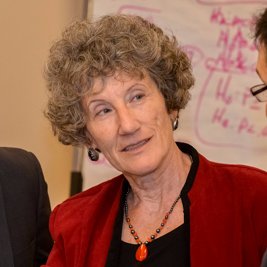At a candidate’s forum in Troy, N.H. last week, state Sen. Jeanne Dietsch repeated her call for a New Hampshire income tax, a proposal that was resoundingly rejected by her fellow Democratic senators last year.
She also promoted a return of the “donor town” system of property tax education funding, an idea one of her Republican colleagues calls “the most divisive tax scheme we’ve ever had in New Hampshire.”
Last year, Dietsch proposed legislation to extend the 6.5 percent Social Security tax on income above the current federal cap — $137,700 — by adding a state income tax of the same amount. This new 6.5 percent income tax on those earnings, which she calls “a fairness tax,” would cost New Hampshire taxpayers approximately $300 million a year.
“Right now, every worker in the state of New Hampshire who earns $137,700 or less pays a 6.5 percent FICA income tax on every dollar,” Dietsch said during the Troy event. “A century ago, that Social Security money was intended to go into a fund that would pay for your retirement. That is not happening.
“So why — when these people who are paying this FICA tax may never ever see any Social Security money — why are we letting the higher earners who have over $137,700 not pay the 6.5 percent on their income above that?”
Audio Player
Listen to Sen. Dietsch propose a 6.5 percent New Hampshire income tax on high-earning families.
According to census data, nearly 40 percent of the households in Dietsch’s district would pay her proposed income tax. When she first proposed her legislation last year, Dietsch said the families affected are affluent so they wouldn’t even notice the tax hike.
“When you are making that much money you don’t pay attention to every penny. This is almost a painless way to raise revenue,” she told NH Business Review.
Not surprisingly, her Republican opponent disagrees.
“I have taken the pledge to oppose a sales or income tax because I think it would devastate our state’s economy,” GOP state Senate candidate Denise Ricciardi told NHJournal. “My opponent, on the other hand, has voted for an income tax, and introduced her own 6.5 percent income tax. Families and small business owners that I meet on the campaign trail tell me every day, ‘please don’t raise my taxes any more we just can’t afford it.’ And I never will.”
At the same candidate event, Dietsch also promoted the idea of returning to the “donor town” system of education funding, where property tax revenues from wealthier towns are sent to Concord to be redistributed to lower-income communities.
“The fact is we are spending as a state plenty on education, but we are not raising that money fairly, and we are not spending it evenly,” Dietsch said. “We have towns like Moultonborough, which pays $4 per thousand for schools, and they raise so much that they keep some of it to run their town with. And here in Troy, we pay over $16 per thousand just for the schools.
“I will be working this fall to rectify both the spending side and the revenue-raising side so that we don’t have that disparity, we don’t have some towns that pay far less than they ought to,” Dietsch added.
Audio Player
Sen. Jeanne Dietsch on “donor town” property tax funding for education.
Sen. Jeb Bradley, who represents Moultonborough, called Dietsch’s proposals a disaster.
“Donor towns were one of the most divisive taxing schemes we’ve ever had in New Hampshire. Ever,” Bradley said. “People like Sens. Jim Rausch of Derry and Nancy Stiles of Hampton and I worked with [Democratic] Gov. John Lynch in the 2011 budget to get rid of donor towns.
“I hope and pray that they never come back,” Bradley said.
As for her claim that towns like Moultonborough are paying less than they ought to, Bradley suggested Dietsch look closer to home. “Bedford, Peterborough, New Boston are all in her district, and these would all likely be donor towns. Plus, she wants to raise their income taxes, too?”
Dietsch is no stranger to controversy. Earlier this year she said one reason she opposed public education options is because working-class parents without college degrees aren’t capable of overseeing their own children’s educations.
“This idea of parental choice, that’s great if the parent is well-educated. There are some families that’s perfect for. But to make it available to everyone? No,” Dietsch said.
“If the dad’s a carpenter, and you want to become a carpenter, then yes — listen to your dad,” she added.
Eventually, Dietsch was forced to apologize, but only after insulting home school parents by claiming the reason some choose home schooling is to hide their child abuse.
Requests for comment from Sen. Dietsch have not yet been returned.




